- Home
- Media Kit
- Current Issue
- Past Issues
- Ad Specs-Submission
- Ad Print Settings
- Reprints (PDF)
- Photo Specifications (PDF)
- Contact Us

![]()
ONLINE

Leading Through
a Pandemic
Editors’ Note
Prior to assuming his current post in 2002, Michael Dowling was the health system’s Executive Vice President and Chief Operating Officer. Before joining Northwell Health in 1995, he was a Senior Vice President at Empire Blue Cross/Blue Shield. Dowling also served in New York State government for 12 years, including seven years as State Director of Health, Education, and Human Services and Deputy Secretary to the governor and the final two years as Commissioner of the New York State Department of Social Services. Earlier, Dowling was a Professor of Social Policy and Assistant Dean at the Fordham University Graduate School of Social Services and Director of the Fordham campus in Westchester County. He has been honored with many awards and recognitions over the years, including being selected as the 2017 Grand Marshal of the New York City St. Patrick’s Day Parade, the 2012 B’nai B’rith National Healthcare Award, the Ellis Island Medal of Honor, the 2011 Gail L. Warden Leadership Excellence Award from the National Center for Healthcare Leadership, the 2011 CEO Information Technology Award from Modern Healthcare magazine and the Healthcare Information and Management Systems Society, the National Human Relations Award from the American Jewish Committee, the Distinguished Public Service Award from the State University of New York’s Nelson A. Rockefeller College of Public Affairs and Policy, an Outstanding Public Service Award from the Mental Health Association of New York State, an Outstanding Public Service Award from the Mental Health Association of Nassau County, the Alfred E. Smith Award from the American Society for Public Administration, and the Gold Medal from the American Irish Historical Society. For 12 consecutive years, Modern Healthcare has ranked Dowling on its annual list of the “100 Most Powerful People in Healthcare.” He was also ranked #44 among large company CEOs in the U.S. and was the nation’s top-ranking healthcare/hospital CEO on Glassdoor’s “Top CEOs in 2019” list. Dowling is past Chair of the Healthcare Institute and the current chair of the Institute for Healthcare Improvement (IHI). He is a member of the Institute of Medicine of the National Academies of Sciences and the North American Board of the Smurfit School of Business at University College, Dublin, Ireland. He also serves as a board member of the Long Island Association. He is past chair and a current board member of the National Center for Healthcare Leadership (NCHL), the Greater New York Hospital Association (GNYHA), the Healthcare Association of New York State (HANYS) and the League of Voluntary Hospitals of New York. Dowling was an instructor at the Center for Continuing Professional Education at the Harvard School of Public Health. He earned his undergraduate degree from University College Cork (UCC), Ireland, and his master’s degree from Fordham University. He also has honorary doctorates from Queen’s University Belfast, University College Dublin, Hofstra University, Dowling College and Fordham University.
Institution Brief
Northwell Health (northwell.edu) delivers world-class clinical care throughout the New York metropolitan area, pioneering research at the Feinstein Institutes for Medical Research, and a visionary approach to medical education, highlighted by the Zucker School of Medicine at Hofstra/Northwell and Hofstra Northwell School of Graduate Nursing and Physician Assistant Studies. Northwell Health is the largest integrated healthcare system in New York State with a total workforce of more than 72,000 employees – the state’s largest private employer. With 23 hospitals, nearly 800 outpatient facilities, including 220 primary care practices, 52 urgent care centers, home care, rehabilitation and end-of-life care services, Northwell is one of the nation’s largest health systems with $13.5 billion in annual revenue.
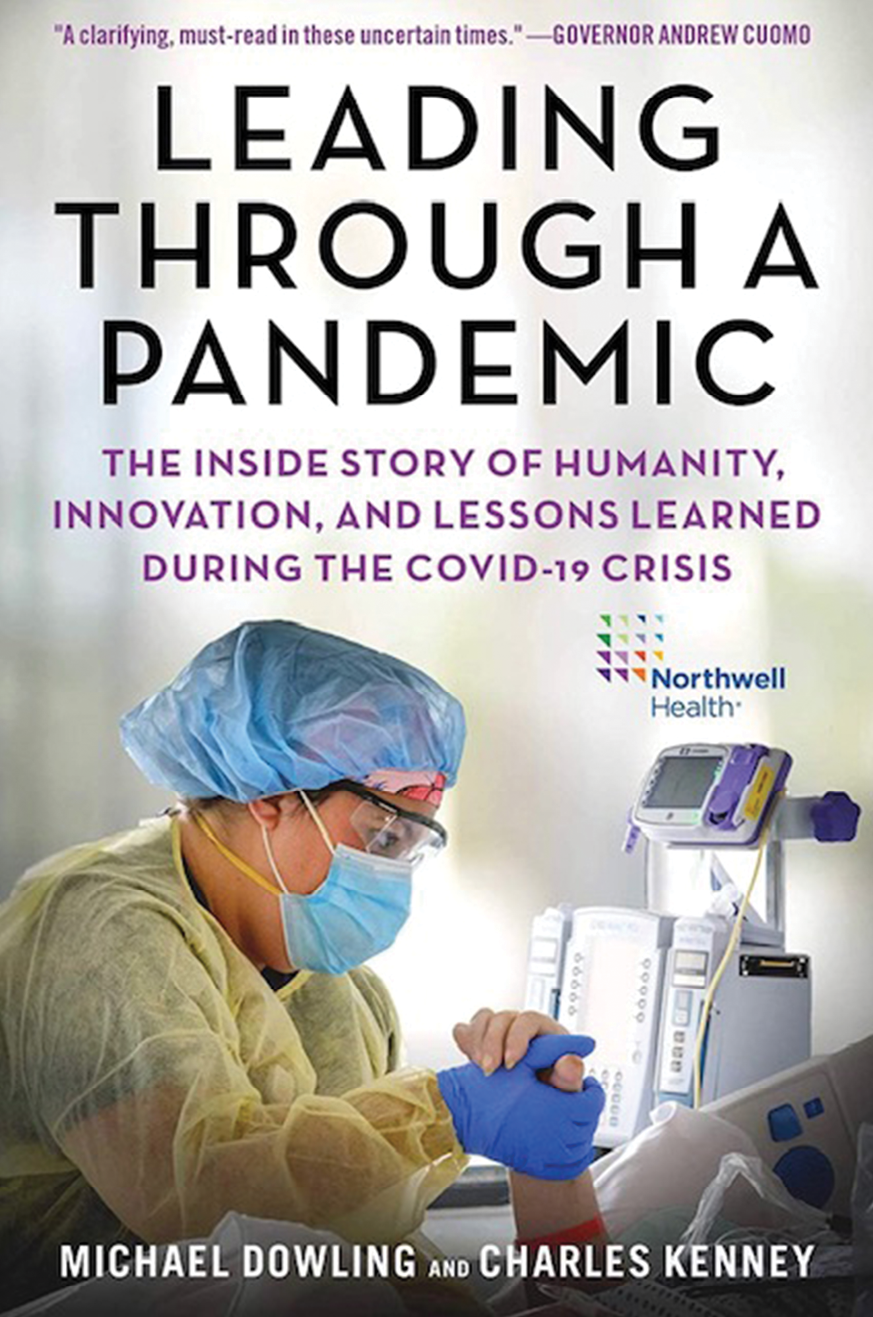
Northwell Health has been on the front lines of the pandemic and has treated more COVID patients than any other health system. Will you discuss Northwell Health’s leadership in this battle and how your team at every level of the institution have stepped up and been the true heroes?
People who go into healthcare are special kinds of people and during the COVID crisis that was on full display. They don’t look upon this as a job but rather as an obligation and a responsibility. You come into healthcare with a special purpose and it is about the team and about how you can help and protect the community. You have to be upbeat and optimistic not only when times are good, but also when times are not so good. When things are difficult, that is the time when positivity is more important than ever, when our character is on display. I also ask our staff when they go home at night and look in the mirror to ask what they did that day. Did they just exist, or did they do something special that day? I am always looking for people at every level of the organization that are looking to make a difference. As a result, we have built a special culture which is critical during a pandemic which is why I just wrote a book to tell the story of being in the middle of this crisis and to document what we went through and what we learned.
You mentioned your book, Leading Through a Pandemic. Will you elaborate on the book and who is the book targeted to?
While many of us have experienced challenging situations, none of us have gone through a situation like we experienced with the pandemic. We were engaged in some horrific experiences, as well as many heroic actions, and I thought that it would be helpful to put it down on paper while we were going through it so that it was current and correct. I spent hours every weekend putting down my thoughts about our experience and what we learned. I wrote it for the general public to help them understand what we went through and also for other hospitals and health systems to help them prepare and plan for future crises – a playbook of sorts. The book gives the human aspects and the technical aspects, the research we conducted, how we reconfigured the hospital, and so on. It is about how to become comfortable with the uncomfortable, how to keep the staff morale high, how to keep your team safe.
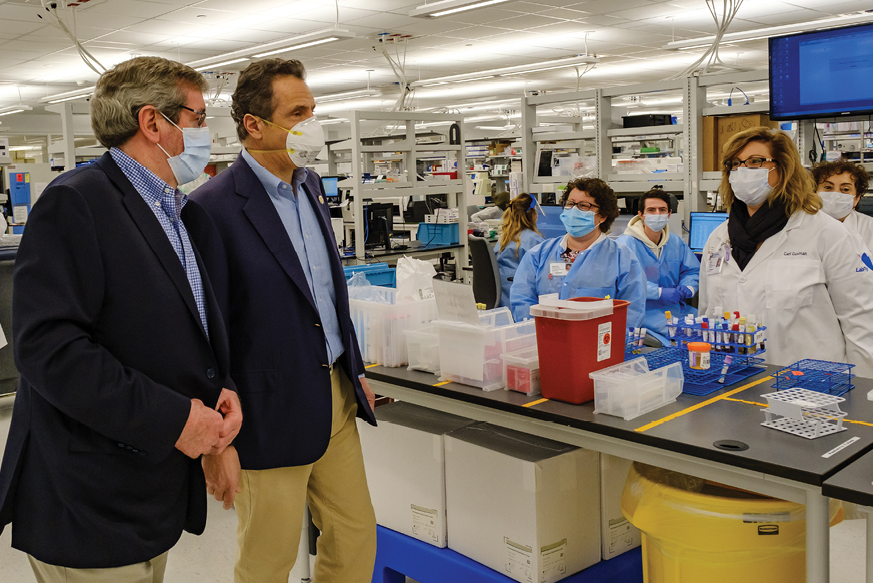
New York Governor Andrew Cuomo and Michael Dowling
tour Northwell Labs
How critical was it for Northwell Health to provide the services necessary to address the emotional stress and mental pressure that its people endured in addressing this crisis?
The key to being successful in this battle against the virus was about how you took care of your people and how you treated your team. It’s about teamwork, collaboration and unity of purpose.
Leadership’s role is to ensure their safety, constantly communicate and provide physical and behavioral support. Our people wanted to know that we had enough masks and gowns and shields, and every single day I, and other leadership, walked the halls of our hospitals and went to the Intensive Care Units and talked to our staff. I wanted them to know that I fully understood what they were going through and I was right there with them. This was true for all of our leadership and we wanted to be clear that we were going to win this battle. If you put your staff on the front lines, you have to be on the front lines with them.
We built tranquility tents where people could come and sit and relax and pray if they wanted to. We had counselors available, behavioral specialists available, chat groups, and did everything possible to make sure staff were supported when they went home or were able to stay in hotels if they did not want to go home and risk getting someone in their family sick. It is also important to realize that many of the staff on the front lines and in the ICUs dealing with COVID had never done this work before as we had to deploy staff from other areas of the hospital and the system to meet the need and it was critical that these doctors and nurses were supported and taken care of. It was an all hands on deck process.
“New York will come back – it is a resilient place and a huge economy – but just like everything else it will come back differently, and whatever the new normal is, we need to remind people that no matter how strong we are, we need to stay humble and realize that life can change quickly and without notice.”
Where is New York and the country today in fighting this war and how concerned are you about a second wave in the future?
On a national level, it is very disheartening to see politics overriding science. We are at war against COVID and to see the constant political battles is terribly disheartening and the disregard for science, especially in the White House, is unbelievable. This is a national problem but there is little national leadership, and even now we still don’t have a national policy about wearing masks. Leadership is about being trustworthy, creating unity and being accountable.
At the state level, we had a different situation in New York because I think Governor Cuomo did a spectacular job in the way he continually led the statewide effort and communicated with the public. The hospitals in New York came together and continue to this day to effectively work together. We were the epicenter and if you look today, we are in much better shape and have put together detailed plans on what we need to do if it comes back in the fall or early next year. At Northwell, we have done a series of tabletop exercises where we have developed our own service plans, staffing plans, supply plans. We have even planned for if the virus comes back and we have a hurricane at the same time, what would we need to do. We have outlined and modeled all of this and we are much better organized if we face this again in the future, which I hope we do not have to do. New York is in a good position today but we cannot be complacent. We have to protect the progress we have made. The behavior of the public is key.
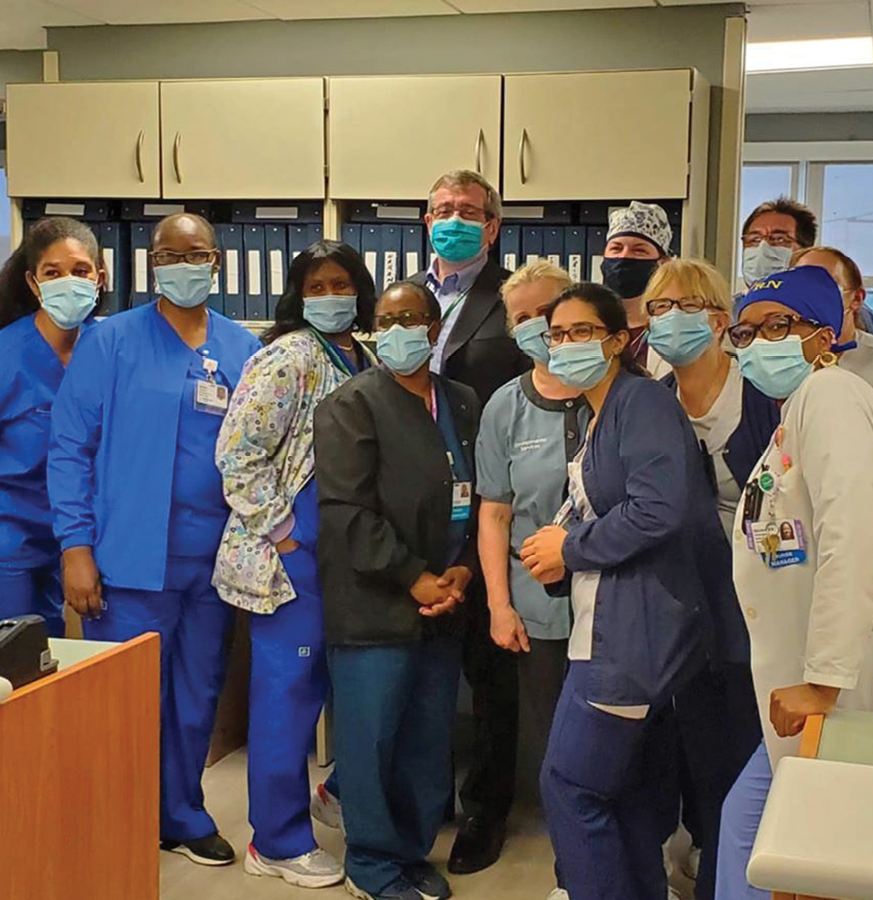
Michael Dowling with front line staff at Syosset Hospital
What is your outlook for therapeutics and a vaccine and how critical are these to winning this war?
It is important to understand that we know a lot more about the disease today than we did at the beginning. We have much better treatment protocols than we did back in March and the mortality rate consistently declined over time. It was an unbelievable learning experience.
In regard to a vaccine, it is critical that a vaccine is developed properly and has gone through the appropriate trials and has been tested in tens of thousands of people. I worry deeply about this as I do not believe that some of our national leaders care much about this except when it comes to how it will impact reelection, which is an unfortunate statement to make, but it is true. I do not think you will have a vaccine available to the public until the Spring and I would much rather wait to have a vaccine that is the right vaccine and has been tested and proven, rather than rushing for a vaccine that will have ill effects. I hope that we let science and public health dictate here and not politics.
How important was the support and admiration that was shown to healthcare workers and first responders and all essential workers during this crisis?
The fact that people showed their appreciation every night at 7:00 PM in front of our facilities was an amazing show of support and gratitude by the public. Staff were so grateful as it lifted morale and made them feel supported. Many times during a crisis like this the focus is on the number of deaths, but we need to also recognize the number of lives we saved. There was a great deal of trust built between the pubic and hospitals and it is critical that we maintain that level of trust going forward. People’s memories are short and we move onto the next thing, but we need to keep reminding people that saving lives goes on every day in our hospitals, not just during a pandemic. I think the pandemic has changed all of us and hope that we will appreciate things a little more and value each other more. We have to continue to earn the public trust and continue to improve and raise the bar.
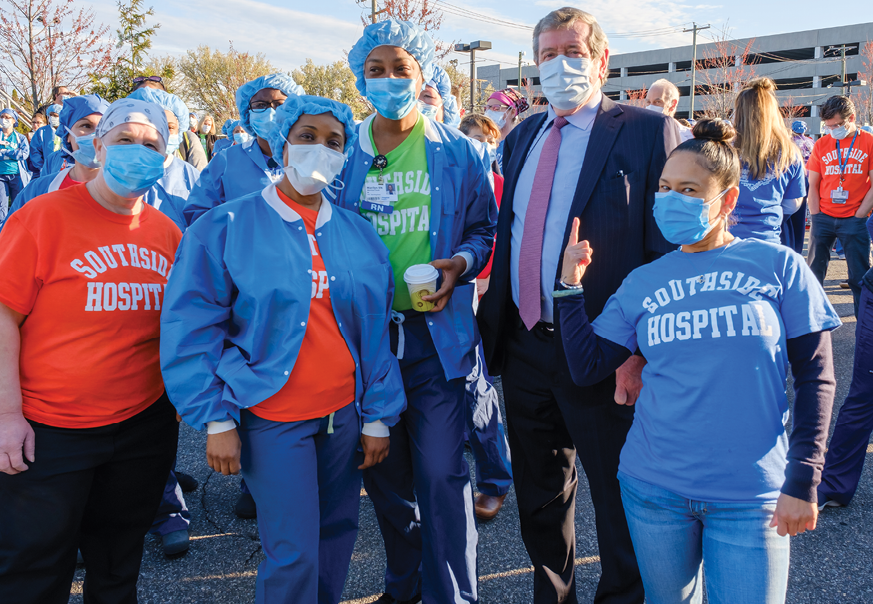
Michael Dowling with front line caregivers at Southside Hospital
It was amazing during COVID how innovative we became and how we fixed things and adjusted overnight since there was no time for unnecessary analysis and discussion, we just had to act and do. It is important that we continue to accelerate innovation post-COVID. The impact of COVID is multi-dimensional. The medical impact of COVID will be greatly ameliorated once there is a successful vaccine, but the economic impacts of COVID will be with us for a long time. This is a decade-long effort and some people will never go back to work and some businesses will never reopen. New York will come back – it is a resilient place and a huge economy – but just like everything else it will come back differently, and whatever the new normal is, we need to remind people that no matter how strong we are, we need to stay humble and realize that life can change quickly and without notice.
Northwell Health has been a leader in regard to testing which has been a major issue. Where is the country in regard to testing and what more can be done to improve the testing system?
The lesson here is that the United States needs to strengthen and rebuild its domestic infrastructure to prepare for future crises. This is a national defense issue. Testing capability is one of the key issues along with supply chain. The CDC and NIH should invest in building a robust surveillance and early warning system.
I also believe that we should begin working with other countries to build global early warning and response systems for the future. This is a global issue. We can’t separate ourselves from the rest of the world. Variations of this disaster will happen again. Let’s not deny the obvious, let’s plan for it.
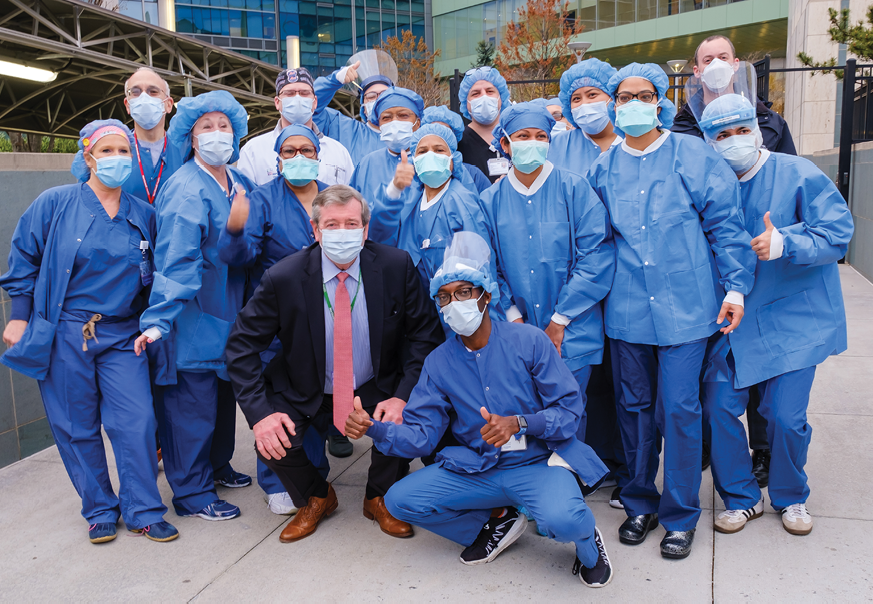
Michael Dowling with staff of Long Island Jewish Hospital
Northwell Health has been a leader in addressing societal issues and concerns throughout its history. Northwell Health recently placed a major emphasis on gun violence prevention. How critical is it for Northwell Health to continue to focus on these types of issues while you are also addressing the pandemic?
I am glad you asked this because I think this is more important now than ever. I am going to be more vocal about gun violence prevention going forward, especially with what is happening in cities like New York, Chicago, and other places. This is a major public health issue and the industry should be out there addressing it. The other issue that COVID displayed clearly was the disproportionate effect on minority communities and the inequities of care delivery. We are working with many of those communities at present and plan to escalate our efforts in partnership with others. This is a call to action which has been clearly displayed by COVID.
Northwell Health is the biggest employer in the region and we have an obligation to be a catalyst to get other people engaged. We can no longer be acting separately and need to be part of a collaborative for the good of the community and the good of the public.
You have devoted your career to the healthcare industry. How proud are you to be a part of an industry that makes such a difference and rises to challenges?
It was a privilege to see what our people and our industry did during this crisis. No matter what happened, our people worked as a team and stayed together and supported each other. A great example is at Huntington Hospital. The director of the hospital told me that he was concerned about the staff on the COVID floor. They had been there since the beginning of the crisis in March and when I was there recently, I went to meet with the staff. I told them that they needed to take a break as they were working almost around the clock for many months. They all said to me in unison that they started with this and that they were not leaving until the last COVID patient was out of the hospital. You walk away from such interactions in awe and feel so privileged to work with such special people and such a special organization. COVID demonstrated what we are capable of. It broadened our perspective. It motivated us all to work even harder to build a better future. It demonstrated what we can do when we come together, when we unify. If only our politics and our political leaders could articulate the same vision.![]()